Steve already posted a lovely recap of the 2018 Monktoberfest, but I wanted to spend a bit more time focusing on the fantastic contributions from our speakers.
We’ll have videos of the talks out shortly (thanks to our video sponsor Google Cloud!), but in the mean time here are some of my conference notes, audience tweets, and my quick impressions from the Monktoberfest talks.
Adrian Cockcroft (AWS): Safety in Engineering
Adrian gave a delightful talk about the importance of chaos engineering, or the process of experimenting to ensure the impact of failures is mitigated. You can’t legislate and predict every possible failure, especially as our systems grow more complex and failure models become correlated.
Chaos engineering is running experiments to ensure that the impact of failures is mitigated. @adrianco #monktoberfest pic.twitter.com/NvAaPDjLkF
— Rachel Stephens (@rstephensme) October 4, 2018
“Synoptic illegibility” means you can’t write down how a system actually works; this happens when it becomes too complex to hold all the system details and interconnections in a comprehensive mental model. Synoptic illegibility means there is an increased need for human judgment and observable systems.
A system is observable if it’s behavior can be determined by its inputs and outputs… #microservices are inherently more observable/@adrianco at #Monktoberfest pic.twitter.com/nl0nNKY9Xo
— Dormain Drewitz 🧟♀️ (@DormainDrewitz) October 4, 2018
The goal, therefore, is not to try to predict what precisely will go wrong, but instead the goal is focusing on building a system where you can quickly detect and fix things when they do.
And this recap wouldn’t be complete without Adrian’s most quoted line:
“To err is human, to err and deploy globally is DevOps.” @adrianco #monktoberfest
— Bradley Holt (@BradleyHolt) October 4, 2018
Melanie Warrick (Google Cloud): Cyber Security For The Previous Generation
Melanie spoke about her experience helping her parents manage their digital security as they aged. Her talk was full of compassionate personal tales and actionable advice about how we can help our loved ones (and ourselves!) be more secure. Melanie reminds us that we are all a “previous generation,” and the advice she gave is universally applicable.
"We're all previous generations." – @nyghtowl
Another raw, personal, insightful talk that is becoming a hallmark of #monktoberfest.
— Mike Maney (@the_spinmd) October 4, 2018
Melanie recommends the EFF’s Surveillance Self-Defense as a good starting resource, with additional tips below.
The best security is the one you know they will adopt/@nyghtowl talks about protecting the previous generation, but same applies to working with your developers #Monktoberfest pic.twitter.com/9u3bwDy8LB
— Dormain Drewitz 🧟♀️ (@DormainDrewitz) October 4, 2018
"Not about being paranoid. It's about being safe." – @nyghtowl #monktoberfest
— Laurence Hart (@piewords) October 4, 2018
At #monktoberfest (the @RedMonk conference) Melanie Warrick @nyghtowl on #cybersecurity:
Question Authority: "You are not required to fill out every field in forms. You do not need to give them all your information." pic.twitter.com/vetIGoRlSG
— Claire Giordano @ PGConfEU (@clairegiordano) October 4, 2018
.@nyghtowl #monktoberfest – remove these! Limit your social presence pic.twitter.com/yatDdglEWE
— Charlie Isaacs (@charlieisaacs) October 4, 2018
Leah McGowen-Hare (Salesforce): Empowerment
After a technology snafu with the projector, Leah abandoned her slides and gave what was among one of the best-delivered talks I’ve been privileged enough to watch in person.
This Empowerment #monktoberfest talk by Leah McGowan (sp) doesn’t have slides and Doesn’t 👏 Need 👏 Them 👏. It’s off-the-charts amazing. pic.twitter.com/FN9FmjPVT5
— David G Simmons 🥑 (@davidgsIoT) October 4, 2018
Leah talked about empowerment, and how bringing out the best in the people around us can help us all operate at a higher level.
Admission #1: I was so enthralled with this talk that I only managed to write down a single bullet point in my notes.
Admission #2: This bullet point was my favorite takeaway from the entire conference. (I think as someone who had a role in organizing the event that I’m not supposed to admit to having favorites.)
Empowerment is setting an environment where people feel safe to take risks.
Empowerment isn't about giving power; it's about helping someone else find, use, explore their own power. #Monktoberfest
— Shane Curcuru 🙀💻 (@shanecurcuru) October 4, 2018
Leah’s talk was an utter delight.
I've been to 8 #monktoberfest's. All of them. The round of applause @LeahBMH just received was louder, clappier and as earned as any I've heard at a conference.
— Mike Maney (@the_spinmd) October 4, 2018
Kevin Barrett (Postlight Studios): Freshman Mandatory Ethics Seminar
In what is a hallmark trait of the Monktoberfest, Kevin delivered a extremely engaging and humorous talk on a very serious subject. He used Stephen King’s The Dark Tower series to help frame ethical decisions faced by coders.
Our code does not exist in a vacuum, and acting ethically means considering the implications of what you write and how it could be used.
.@kevboh asks what is quite possibly the most powerful question in technology today: "Can you guarantee a piece of code I write would never be responsible for a person’s death?” #monktoberfest
— Mike Maney (@the_spinmd) October 4, 2018
It’s like we’ve internalized the instinct to separate concerns/@kevboh nails the danger of engineers not considering what their work is used for #Monktoberfest pic.twitter.com/u6JEwRwcu5
— Dormain Drewitz 🧟♀️ (@DormainDrewitz) October 4, 2018
"it may not be used for blood harvesting but any piece of shipped code changes the world" – @kevboh ethics #monktoberfest
— Ruthless Netpromoter (@monkchips) October 4, 2018
“It’s not like someone opened a ticket saying ‘I should be able to become death, the destroyer of worlds.” – @kevboh talking about discovering the ethical outcomes of well intentioned work. #monktoberfest #OppenheimerPullRequest #github.com/Alamogordo
— noahharlan (@noahharlan) October 4, 2018
Kevin offers the following framework to use as you consider the implications of what you work on:
- ask your leadership
- ask experts
- look to published charters, contracts, and principles
- how could someone use this to harm on purpose?
- talk with your coworkers
@kevboh did a thought provoking & humorous talk on ethics in coding! Great job #monktoberfest pic.twitter.com/gUMYJgYOGG
— Leah McGowen-Hare (@LeahBMH) October 5, 2018
Cecy Correa: Psychology of Fake News
Cecy spoke about how fake news is not a technology problem, but rather how it’s a human problem.
this #monktoberfest talk by @cecycorrea is 💯 theory of knowledge, how it informs fake news, the difference between beliefs and facts.
— Secret Monk Chips (@monkchips) October 4, 2018
Why do people believe fake news?
- People are predisposed to agree with things that support their existing views.
- Hot takes are designed to appeal to our emotions.
- People are often unaware of their own depth of knowledge (or lack thereof), and typically presume that they know more than they actually do. (Example: ask someone to draw a picture of a bicycle. We all think we “know” about bikes, but surprisingly few of us can draw an accurate bicycle from memory.)
- People don’t like to feel dumb when they find out their knowledge is shallower than they assumed, and can create the urge to double down.
At #Monktoberfest @cecycorrea talks about the psychology of fake news. Tl;dr #FakeNews appeals to our emotions. /Ft. hate clicks, hot takes, & the research on psychology of decision-making by Nobel prize winner Daniel Kahneman. HT @RedMonk pic.twitter.com/Yzmzcw5DHE
— Claire Giordano @ PGConfEU (@clairegiordano) October 4, 2018
The Psychology of Fake News and the ‘hate click’ — how news spreads by emotional reaction. @cecycorrea #monktoberfest pic.twitter.com/nSf7kDeiM2
— Rachel Stephens (@rstephensme) October 4, 2018
Cecy’s conclusion is that relying on technology to figure out if something is fake is going to be disappointing; we can’t simply rely on AI and algorithms, there also has to be an element of human judgment (both as curators and consumers.) We have to find a way to help people realize their ignorance without making people feel stupid. We have to approach the problem with empathy, and we have to understand that psychology is a huge element to the problem.
Emily Nakashima (Honeycomb): Startup Hiring
Emily’s talk is based on the concept that the current hiring process is suboptimal for both candidates and hiring managers. The interview process is miserable for everyone, and worse, rarely predictive of job performance. She shared ways that she and her employer, Honeycomb, have worked to change that.
Emily’s talk was imminently quotable. Here are some of my takeaways:
- hiring is broken: let’s fail in new and exciting ways!
- hire for strengths and not for lack of weaknesses
- if you want to attract minority groups, the best way to change that dynamic is to hire the most senior person possible. diverse top leadership draws in more diverse talent.
- interview by treating someone like they are already a valued member of your team
- make interview process as close as possible to performing on the job. this includes their ability to work with legacy code, communication skills, and product decision making
- use contract-to-hire to trial working together (“test in production”)
Make your interview process as close to real working as you can/@eanakashima on fixing hiring with a great analogy #Monktoberfest pic.twitter.com/W5avcmRDiC
— Dormain Drewitz 🧟♀️ (@DormainDrewitz) October 4, 2018
By adopting a less adversarial interview process, and dialing back the listed requirements on the jobs they post, @eanakashima’s team saw a big change in the diversity of their hiring, without changing their standards. #Monktoberfest
— Duane “I’ve got an idea for a new license” O'Brien (@DuaneOBrien) October 4, 2018
She also shared her rules for interviewing:
some @honeycombio / @eanakashima tips for a successful hiring process:
– no adversarial interviews
– ask candidates how they will be most successful in the interview
– no surprises
– be transparent / give them tips (“if you get stuck, talk us through your thought process”)— Rachel Stephens (@rstephensme) October 4, 2018
Any my favorite quote from Emily:
“We’ve had hires not work out, but they tend do not work out not because we don’t see them clearly, but because we don’t see ourselves clearly.”
listened to a talk by @eanakashima on how @honeycombio does hiring and holy crap, i’ve done my own research on hiring before and i did not even KNOW hiring could be this good.
— Sophie Smithburg (@tehgeekmeister) October 5, 2018
KellyAnn Fitzpatrick (RedMonk): Tales From the Post-Millennial Computer Science Classroom
Kelly is currently wearing a lot of hats. Not only is she RedMonk’s newest analyst, but she’s also finishing out the semester as a Visiting Lecturer at Georgia Tech’s School of Literature, Media, and Communication, where she co-teaches computer science classes. On top of holding two jobs, she’s also writing a book. (Basically, she is a super hero.)
Kelly spoke about her experiences teaching computer science across a generational divide. She discussed how students’ technological and cultural experiences vary from her own, and how that impacts her approach in the classroom.
Kelly has a series of posts in the works about her experiences teaching computer science, so I’ll leave the details to her. You’ll definitely want to follow along as she posts, because the talk was wonderful!
Greg Avola (Untappd): From the Source: An Untappd Story
Greg’s company, Untappd, has grown up alongside Monktoberfest. Greg spoke at the first Monktoberfest in 2011, and this year shared how the company has grown in the last eight years. From how their massive user growth, the evolution of their tech stack, and how they moved from being founder-only company to a large team with substantial outbound sales effort, it was an impressive tale of scaling a business. Congrats, Greg!
650,000,000 beer check ins to @Untappd over the past 8 years. Six. Hundred. And. Fifty. Million. Congrats @gregavola #monktoberfest
— Mike Maney (@the_spinmd) October 4, 2018
We don’t use technology because it’s new and flashy. We use what works for us/@gregavola on the @untappd infrastructure #Monktoberfest pic.twitter.com/mvdlWclS9W
— Dormain Drewitz 🧟♀️ (@DormainDrewitz) October 4, 2018
Best ever feel-good props to @untappd founder & CEO @gregavola, sharing his journey and the Untappd history here at #Monktoberfest. Something we should all strive for, to make something users consider magic!
"This app is made by unicorns." pic.twitter.com/0rMIenUEHJ
— Claire Giordano @ PGConfEU (@clairegiordano) October 4, 2018
Dormain Drewitz (Pivotal): Death and DevOps
Dormain’s talk was a delightfully meta examination of culture. Culture is how we’re wired socially to handle human events. From a young age, kids know the core components of a birthday party. Celebrations are an important form of culture, but the real lasting legacies are not around parties but instead are around death. We don’t have a good sense of how ancient Egyptians celebrated their birthday, but we very much understand how they viewed death.
In a similar vein, the cultural artifacts that will matter most at your work is not what happens when things are going well, but what you do when shit hits the fan.
You have to be organizationally self-aware: can we acknowledge our bad habits? Do we say we have a “blameless post mortem” cultures when we’re actually “blamestorming”? Do bosses give orders or ask questions? Have we practiced helping people manage stress, and have we provided people with language they can use in stressful situations?
loving how @DormainDrewitz is drawing us into this story on The Death of Devops. going meta. the birth, death, and life of a human (or service). what are the ceremonies by which we manage our lives (or apps and services), our outages, our birthdays, and funerals #monktoberfest
— Ruthless Netpromoter (@monkchips) October 5, 2018
WWSD: What Would Socrates Do? On stage at #Monktoberfest @DormainDrewitz challenges us to think about culture & #leadership: Am I just giving my team orders? Or am I leading them with questions? pic.twitter.com/WGROa6nWIT
— Claire Giordano @ PGConfEU (@clairegiordano) October 5, 2018
"Ping pong and pizza don't fix things"@DormainDrewitz
💯💯💯💯💯#Monktoberfest
— Cecy "Yo Voté" Correa ✌️ (@cecycorrea) October 5, 2018
Joe Emison (BuildFax): How to Fold a Fitted Sheet
In what was legitimately the most impressive live demo I’ve ever seen at a tech conference, Joe showed us all how to neatly fold a queen-sized sheet by yourself.
I’m missing my flight for this. How to fold a fitted sheet, and how it pertains to commercial search. #Monktoberfest @JoeEmison pic.twitter.com/sgErvapVJh
— Charlie Isaacs (@charlieisaacs) October 5, 2018
(I can’t embed Charlie’s video here, but you should definitely click through to watch it!)
Joe then tied this into a great metaphor about running a technical organization. To successfully fold a fitted sheet, you take a challenging problem (“taking pockets”) and transform it into a an easier, solvable problem (“folding rectangles.”) To transform an organization, you have to understand it’s respective pockets in the legacy code base and then chart a path (with things like automation and test-driven development) to get to folding rectangles.
“The most effective way to bring automation to a Legacy code base is to do TDD on all regressions” @joeemison #monktoberfest
— Ted Bedwell (@tedbedwell) October 5, 2018
The single best strategy I’ve found to do is TDD on regressions.. I’ve done this in 3 places and they turn into organizations with reasonable test coverage/@JoeEmison shares gold at #monktoberfest
— Dormain Drewitz 🧟♀️ (@DormainDrewitz) October 5, 2018
A lesson in folding fitted sheets as allegory for adapting to organizations to enable change – such a good talk by fellow Eph @JoeEmison at #monktoberfest
— noahharlan (@noahharlan) October 5, 2018
Claire Giordano (Citus Data): Better Living Through Empathy
Claire talked about how important empathy is to success. In Clay Christensen’s ‘jobs to be done’ metaphor, successful selling is about understanding what jobs are people trying to do, and then understanding how to give them what they need. Customers might not always articulate their “jobs” (or as Peter Drucker says, “the customer rarely buys what the company thinks it is selling.”) Empathy is required to connect with your customer. Claire says, “show me a great marketer and I will show you a person with great empathy.”
You can’t be a good marketer without empathy. You can’t be a good leader without empathy. You can’t be a good anything without empathy. Empathy is crucial to navigating the world.
“You can’t be a good X without empathy…”
X =
Leader
Parent
Conference Organizer
Marketer
Everything#Monktoberfest @clairegiordano pic.twitter.com/6hRLdv2sW6— Charlie Isaacs (@charlieisaacs) October 5, 2018
If you don't tell people the takeaway, they'll pick their own. – @clairegiordano #Monktoberfest
— Margaret Fero (@MaggieFero) October 5, 2018
Closing out #monktoberfest with @clairegiordano and Better Living Through Empathy (and puppies!) pic.twitter.com/pPWgLwdwkh
— Rachel Stephens (@rstephensme) October 5, 2018
Thanks again to all our speakers for their amazing presentations, and a special thanks to Steve for all the work that goes into curating the talks and organizing the event. Also, thanks to Shane Curcuru for compiling this spreadsheet of talk logistics that helped me organize talk titles and Twitter handles!
See you all in 2019!
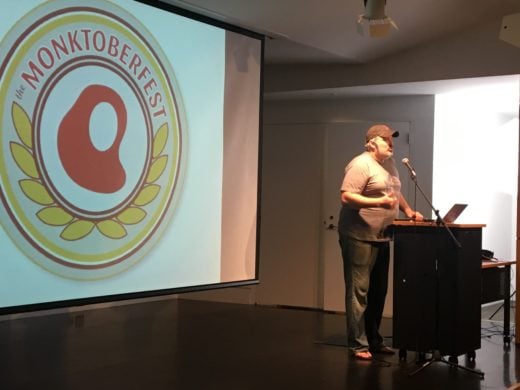
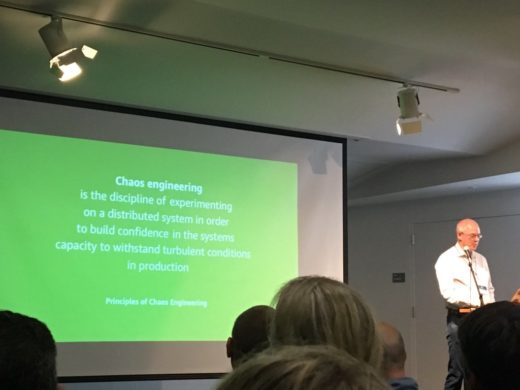
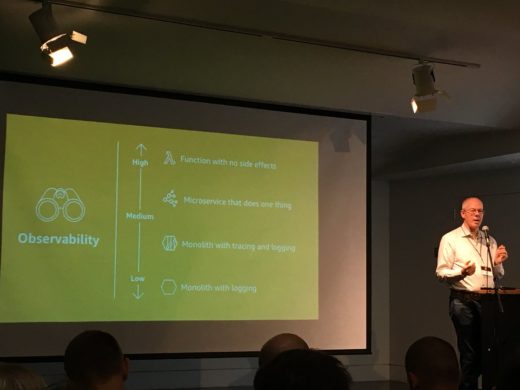
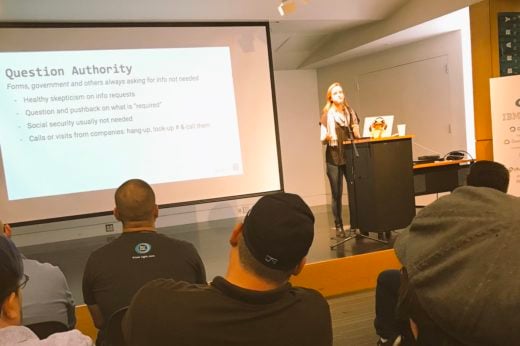
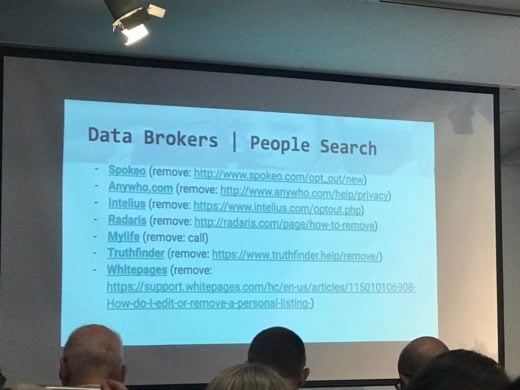
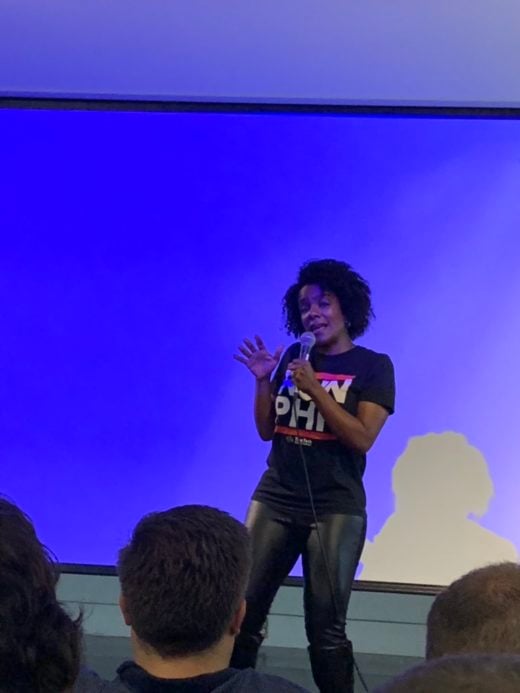
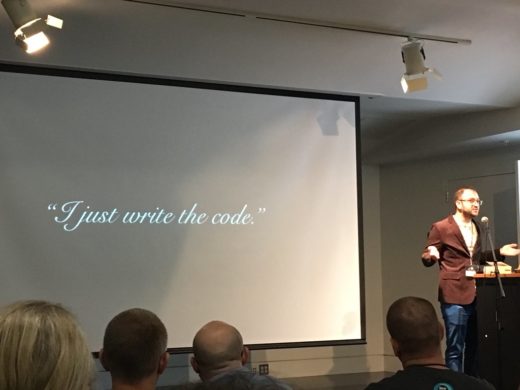
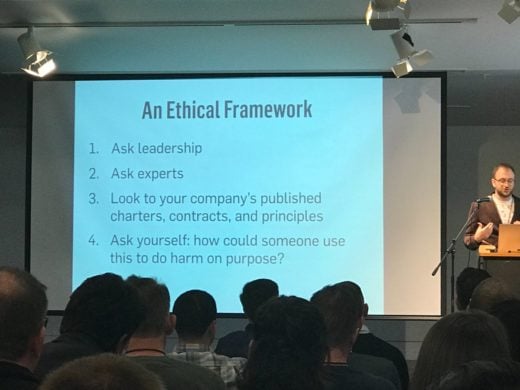
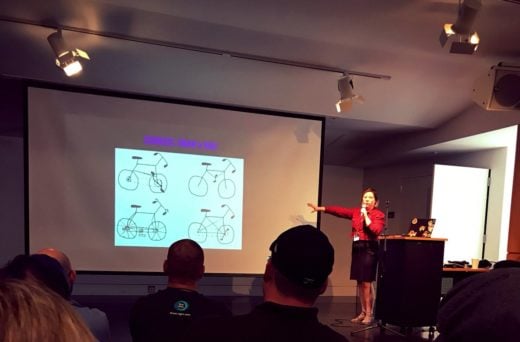
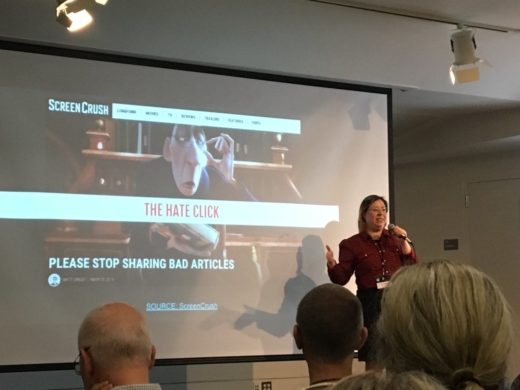
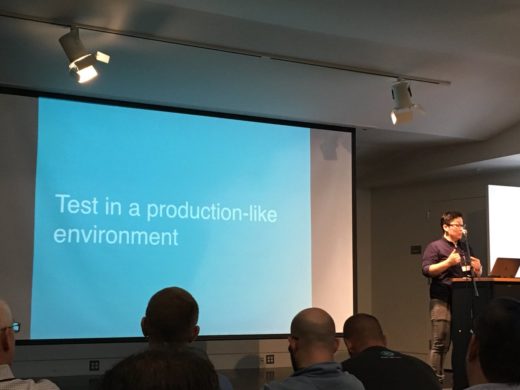
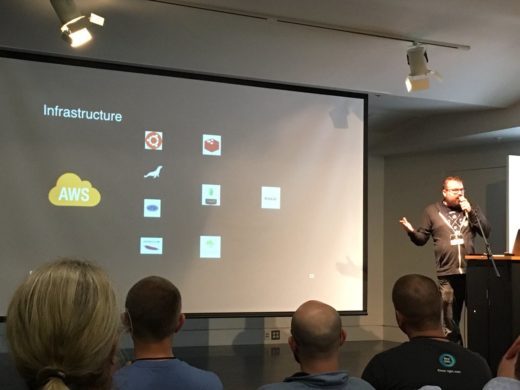
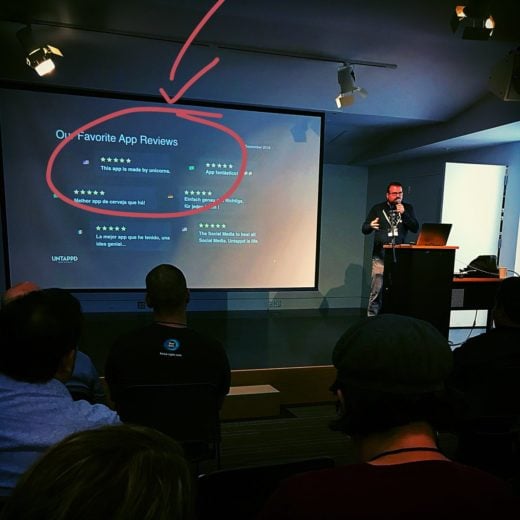
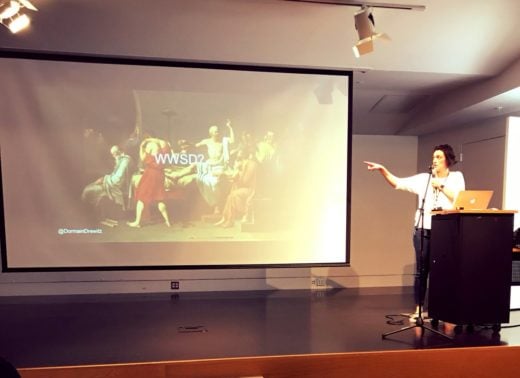
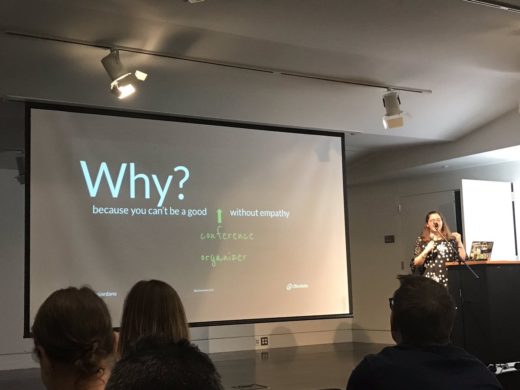
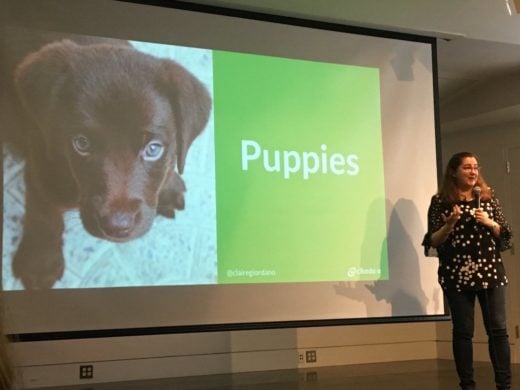
No Comments